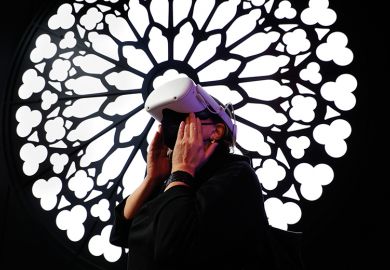Source: Alamy
Privilege of access: many students in Moocs have completed higher education
Massive open online courses could be hindering the development of open educational resources because they do not allow everyone to contribute to the innovation of content, a conference has heard.
Patrick McAndrew, professor of open education at The Open University, said that although some online resources were genuinely open in this way, the best known Mooc platforms - such as Coursera and edX - were not.
Speaking at Open Educational Resources 2013, held at the University of Nottingham on 26 and March, he praised the work of platforms such as Peer to Peer University and the OpenCourseWare Consortium for “really being careful to do everything in a way that truly meets criteria of ‘open’”.
“However, a lot of the organisations involved more recently, like [US Mooc providers] Coursera and edX, have not paid so much attention. Often you can’t actually see into the [course] materials until you make a commitment,” he said. “They are creating a sort of closed community in the open.”
This matters, he said, because the development that can occur when materials are genuinely open - such as students translating courses into other languages - is restricted.
Speaking to Times Higher Education, he added: “You now have people who have been through a [Mooc] programme saying: ‘I want to talk about what I’ve done. I want to show people what I’ve done. But if the system itself is closed you can’t do those things - you can’t help people really innovate.”
Professor McAndrew warned that universities needed to start producing more polished open resources to share with the world in order to compete with the proliferation of off-the-shelf courses like Moocs.
“Moocs have tackled a problem. They can offer something that is structured,” he said. “Often what we do in universities is we experiment in ‘catwalk technologies’ - where you dress something up so you can show it to the world, but you wouldn’t necessarily wear it in the rain. What we need to do is move towards ‘ready-to-wear’ things you can pick up off the shelf.”
He said online courses were becoming part of universities’ business models, and that the time had come to “build on experiments” and consider “how those innovations become more mainstream”.
Professor McAndrew was presenting findings from the Open Educational Innovation and Incubation project, run by the European Association of Distance Teaching Universities.
Darco Jansen, EADTU programme manager, used his conference address to question the influence of new Mooc providers. He dismissed claims that they will improve access to higher education.
“Most students that participate in Moocs already have good access to higher education…or they have already completed higher education. So how can you say Moocs are creating more accessibility?”
He said the scope of free online resources, including Moocs, was limited because only wealthy institutions could develop them.
“Who is providing open educational resources? They are rich people, rich companies, rich universities, because they have the money to put out free educational resources and Moocs online,” he said, adding that many of the resources were “hard business” designed to get the attention of international students.
“There is a lot of company money involved. It’s a new Western imperialism to conquer the world,” Mr Jansen said.
Register to continue
Why register?
- Registration is free and only takes a moment
- Once registered, you can read 3 articles a month
- Sign up for our newsletter
Subscribe
Or subscribe for unlimited access to:
- Unlimited access to news, views, insights & reviews
- Digital editions
- Digital access to THE’s university and college rankings analysis
Already registered or a current subscriber? Login




